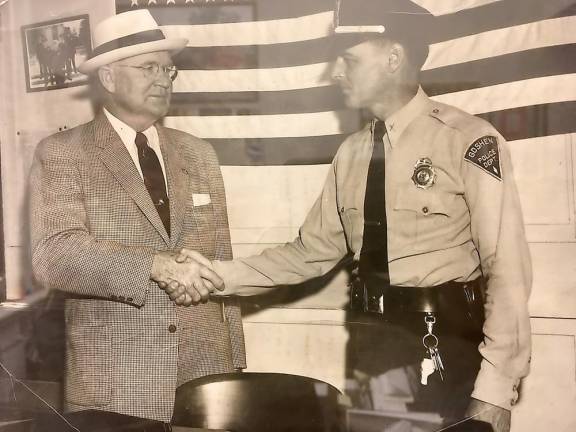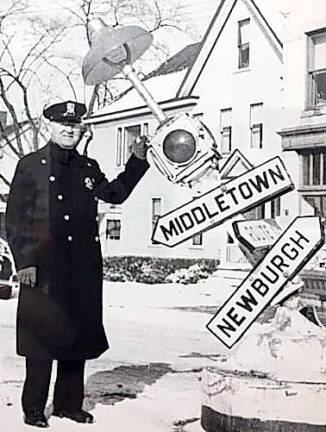Goshen's Citizens in the Great War: The Chief
Goshen. After serving in World War I, Stanley Golemboski returned to his village to become "Goshen’s Gift to the Cause of Law and Order" and its longest-serving police chief.


On May 28, 1932, a special ceremony was held on the grounds of the New Windsor Cantonment to mark a momentous occasion. On these grounds, the headquarters of the Continental Army, on August 7, 1782, George Washington announced that a “Badge of Military Merit” in the shape of a purple heart would be awarded by himself personally to men who had shown great courage and gallantry during the Revolutionary War. This was the first formal U.S. military award. For the bicentennial of Washington's birth, a new medal was created with his likeness on it, the Purple Heart.
First proposed in 1918 by the American Expeditionary Commander John J. “Blackjack” Pershing, the Purple Heart was made a reality by the Chief of Staff of the U.S. Army, Douglas MacArthur, who would also be the first recipient. To this ceremony, 137 veterans of the First World War who were wounded in action were invited, all from the Hudson Valley. Most came from Newburgh, many from Poughkeepsie, and exactly one from Goshen: Private First Class Stanley Golemboski of Company C, 308th Machine Gun Battalion, 78th Infantry Division.
Exactly one year after the United States had declared war on Germany, on April 6, 1917, Golemboski was inducted in Goshen and found himself in France one month and two weeks later. The 78th Division trained with allied instructors in trench warfare and the intensity of combat. Because of the lack of modern American-made machine guns, Golemboski’s battalion was trained and equipped with British Vickers machine guns. In France, during the summer and fall of 1918, the division was considered the “point of the wedge” of the final offensive that would knock out Germany.
The Division’s first major engagement was the Battle of St. Mihiel, Sept. 12-15, during which the American troops battled through mud and heavy rain to force the German Army out of a fortified location they had held for four years. Though a swift battle, it was America’s first independent victory of the war, and would prove to the Allies and world that America’s sons could best the battle-hardened troops of Germany.
Following this, the 78th prepared for deployment in the massive upcoming Meuse-Argonne Offensive on Sept. 26. But three days prior to the start, Golemboski was wounded “slightly,” according to military records. The exact details of his wound are lost to missing paperwork, but he most likely was injured by a stray bullet or shrapnel from an artillery shell, both common wounds for troops in the trenches. He would continue to serve with his battalion until March of 1919, when he was shipped home and honorably discharged on March 20.
'His feared long reaching arm'
Golemboski continued to bring great pride to his community, serving as the Chief of the Goshen Village Police Department from 1949 to 1961. According to the department, he is their longest-serving officer, with around 50 years of experience. The local papers of time recognized him as a paragon, as “Goshen’s Gift to the Cause of Law and Order." In fact, the Independent Republican newspaper would say, in 1950, that “his feared long reaching arm has made honest men out of practically every crook in Goshen."
His dedication to improving the area would not stop with law enforcement. He also took care of all of the flowers and flowerbeds in Goshen to beautify the village, and the tradition continues to this day.
Golemboski died in 1978, at age 83, and was interred in Saint John’s Cemetery in Goshen, keeping vigilant watch over the village as he had done for so many years. In recognition and honor of a lifetime of dedication for his country in both the courts and Goshen, a memorial plaque and stone was unveiled at the Orange County Government Building in 1979. The current whereabouts of these objects is unknown, though it may be in storage in nearby government facilities.
Although it has been more than 40 years since his passing, the the police department still holds Golemboski in high regard. His military service was known to the department, and still take pride in it. When I discussed Golemboski with Chief James C. Watt, he spoke of his predecessor with respect and admiration.
Despite the years that have passed, Golemboski’s tireless efforts to benefit society are still remembered, showing exactly how great of a contribution he made to his community. A special thank you to Chief James C. Watt and the Village of Goshen Police Department for their assistance in the acquisition of information and a photo of their past chief.